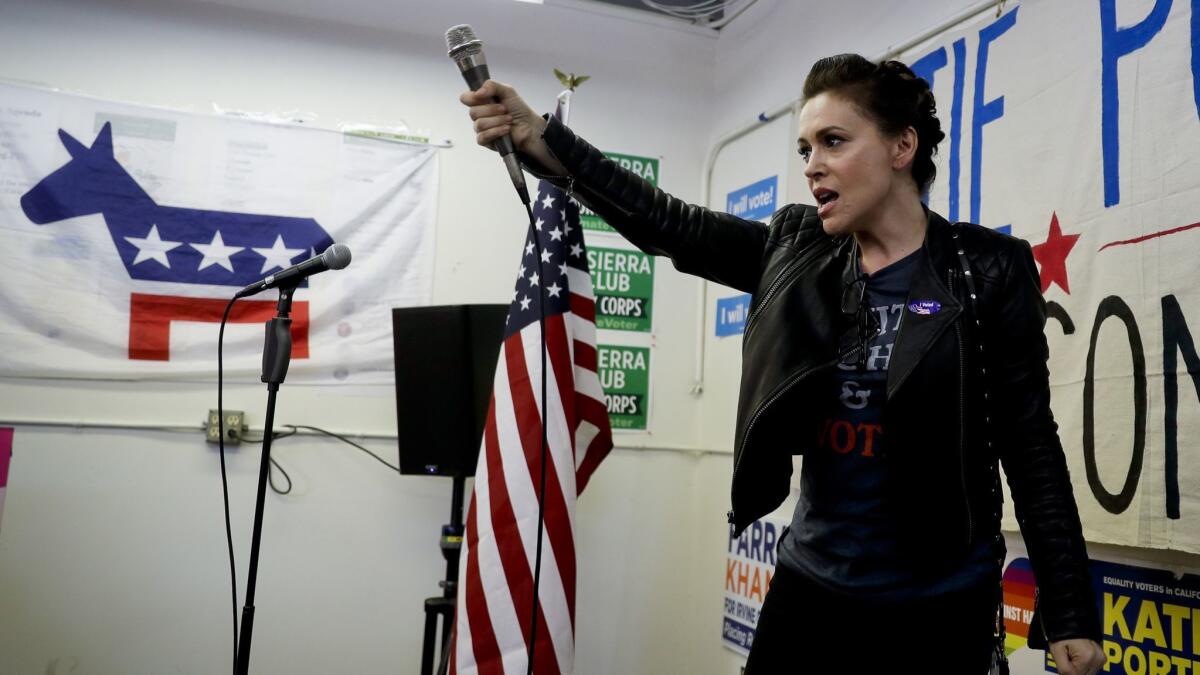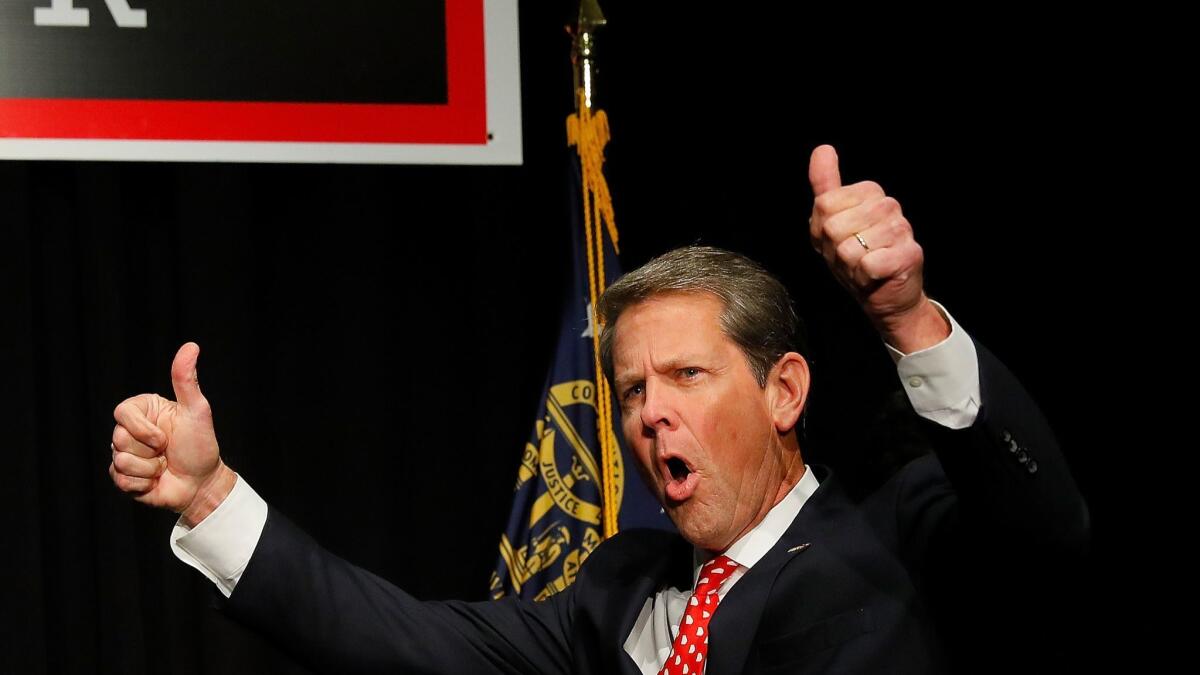Must Reads: Here’s why Stacey Abrams’ election loss has Georgia’s film workers on edge

- Share via
Reporting from ATLANTA — When Democrat Stacey Abrams lost Georgia’s gubernatorial election to Republican Brian Kemp, Suehyla El-Attar was distraught.
Not only had the candidate she was rooting for failed to make history as the nation’s first black female governor, but as she watched a die-hard conservative, yet again, take the helm of the Deep South state, she faced an unsettling question: Would her work in Georgia’s booming film industry dry up?
“The minute I knew Kemp won, I thought ‘There go all my opportunities,’” said the Atlanta-based actor and playwright. “I don’t have words for the fear. I’m worried about jobs disappearing. I’m worried about how to fight and maintain my stamina. I’m worried about how to honor my principles, while still being able to pay the rent.”
For months, many who work in Georgia’s burgeoning film and television industry have been on edge as Abrams sparred with Kemp over healthcare, guns, immigration and the fundamental fairness of the election itself. Throughout the campaign, Abrams dubbed Kemp an “architect of voter suppression,” claiming Kemp used his former role as secretary of state to purge the voter rolls and make it harder for minorities to cast ballots.
When Kemp finally emerged as the victor, a smattering of Hollywood stars, including Bradley Whitford, Alyssa Milano and Ron Perlman, swiftly took to social media to urge the film industry to boycott Georgia and wreak economic vengeance on the Southern state.
“There are over 20 productions shooting in Georgia,” Milano said on Twitter. “Is the entertainment industry willing to support the economy of a totally corrupt state that suppresses democracy; where the winner isn’t the best choice for the people but the best schemer or crook?”
Many worry the fallout could threaten the state’s newfound status as Hollywood of the South and harm tens of thousands of people who work in the local film industry — not just actors and screenwriters, but location scouts, stunt doubles, production designers, grips, camera operators, makeup artists, costume designers, set dressers, production assistants and prop makers.

“All I’m thinking is Hollywood, hello, don’t leave” said El-Attar, who juggles theater with film and TV and has taken on roles in “Ant-Man and the Wasp,” “Ozark” and “I, Tonya.”
“We can still fight.”
With Georgia’s film and television industry now shooting more major feature films than California, thanks to a package of generous tax film credits introduced by the state’s Republican governor more than a decade ago, a lot is at stake: The industry brought in more than 92,000 jobs and nearly $4.6 billion in wages to Georgia in the last year.
“People who are pushing for a boycott have to understand what that means to real people’s lives,” said Bethany Anne Lind, an Atlanta actress who is raising two young children with her husband, also a full time actor. “If productions move to other states, that means I don’t have work. That’s how I pay my bills.
“People in our industry should be backing us,” she added. “For them to back out because we didn’t win one election, it just doesn’t feel thought out.”
Beyond the potential threat to their livelihoods, many film workers say a boycott could cause more political harm than good. If film companies pulled out of Georgia, they could probably trigger an exodus of blue voters from this traditionally red but increasingly purple state, decreasing the odds of future Democratic wins.
Abrams, who announced last week that she was setting up Fair Fight Georgia, a new political action committee to champion fair elections across the state, urged those who work in the entertainment industry to channel their energy into supporting election reform rather than a boycott.
“The hard-working Georgians who serve on crews & make a living here are not to blame,” Abrams tweeted over the weekend. “I promise: We will fight - and we will win.”
Right now, calls for a boycott have focused on the issue of voter suppression, along with strong, generalized feelings of antipathy toward Kemp. But many fear the backlash against Georgia could build if Kemp signs off on so-called “religious freedom” legislation that critics oppose as discriminatory.
Georgia’s film workers have long anticipated the possibility that a gung-ho Republican governor could trigger a major economic backlash, akin to the one that engulfed North Carolina two years ago when legislators passed HB2, a law that required multiple-occupancy restrooms to be used by people based on the sex listed on their birth certificates.
In 2016, Georgia’s Republican governor, Nathan Deal, averted a similar boycott by vetoing a contentious bill that would have given faith-based organizations more leeway to deny services to gay, lesbian, bisexual and transgender people.
Throughout the campaign, Kemp has said he would sign a religious freedom law. In recent months, he has specified that he would not support a law that went as far as the one Georgia lawmakers passed in 2016, but would sign one that mirrored the 1993 federal Religious Freedom Restoration Act signed by President Clinton.
While such a bill would not set national legal precedent — 21 states have already enacted laws that echo the federal legislation, which prohibits the government from burdening a person’s exercise of religion unless it demonstrates a “compelling governmental interest” — it could exacerbate tension and put Georgia at the center of a culture war showdown.
On the campaign trail, Abrams voiced her opposition to any religious liberty legislation, arguing it is legally unnecessary and morally wrong. LGBTQ activists also say a bill modeled on the federal statute is discriminatory and a step backward.
So far, no Hollywood company has announced it will stop shooting in Georgia. But with calls for boycotts precipitating any religious freedom law, many workers are jittery.
Tom Pierce, 37, an assistant film location manager, has already started researching film industries in Vancouver, New York and Los Angeles and putting out feelers to contacts.
While Pierce has a steady stream of work lined up in Georgia through the end of the year, he fears productions that are looking at the state might choose to stay in California — even if Kemp does not sign off on “religious freedom” legislation. Tax incentives, he said, had improved in California and New York.
“My main concern is that the industry is going to dry up here,” he said. “But I’m also a little jaded living in a state where the majority can look at Donald Trump and say, ‘I want more of that.’”
Josh Hancher, 44, first assistant camera, said he did not want to leave his home in Griffin, a small town about 35 miles south of Atlanta, but he would have to strongly consider relocating if calls for a boycott gained steam.
“I’ve got a 10-year-old and a 13-year-old,” he said, “and I’ve got to keep the money coming in.”
While he hoped Kemp and those urging a boycott would scale down the rhetoric and adopt a more conciliatory approach, he did not rule out supporting a boycott if Kemp passed religious freedom legislation.
“Discrimination on any level can’t exist,” he said. “If the industry chooses to take a stand, I would take a stand, too. I couldn’t feel good about working in a business that just rolled over for the sake of making money at the expense of discrimination. That’s a sickening thought.”
Many Georgia film workers urging Hollywood not to boycott say they absolutely understand activists’ disappointment and anger.
In the thick of the midterm last month, Topher Payne, 38, a screenwriter and playwright who’s written a string of screenplays for the Hallmark Channel, said he and his husband decided: “If Stacey doesn’t win, that’s it. We’re out.”
But after reflecting on the closeness of the race and hearing Abrams’ call for a new campaign to fight for fair elections, the couple reconsidered.
“The South in general can be a very, very frustrating place to root for progress,” Payne said. “But I am not leaving my home state to a bunch of ignorant people who do not have its best interests at heart. The most dangerous thing in Southern elections is apathy — believing that progressives don’t stand a chance — and so it is crucial that we stay here and lay claim to our home.”
After phone-banking for Abrams during the campaign, Diany Rodriguez, 36, an actress, said she was reluctant to criticize anyone boycotting.
“I don’t want to tell anyone they don’t have a right to lash out and put their money where their mouth is and make Georgia pay,” she said. “I personally feel very hurt as well. I want the entities that are in power, absolutely, to feel the financial crush of discounting our rights.”
Yet still, she felt it was premature to call for a boycott now, before Kemp has officially taken office or signed any hot-button, polarizing legislation.
“Georgia is not a lost cause,” Rodriguez said. “We have to be willing to say it hasn’t happened yet. How can we fix it?”
Twitter: @jennyjarvie
More to Read
Sign up for Essential California
The most important California stories and recommendations in your inbox every morning.
You may occasionally receive promotional content from the Los Angeles Times.











